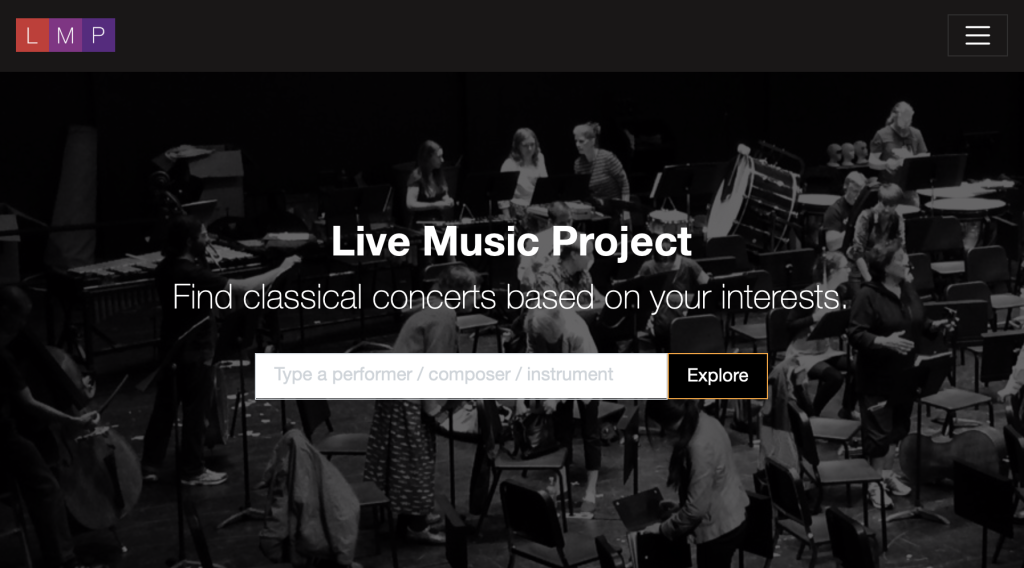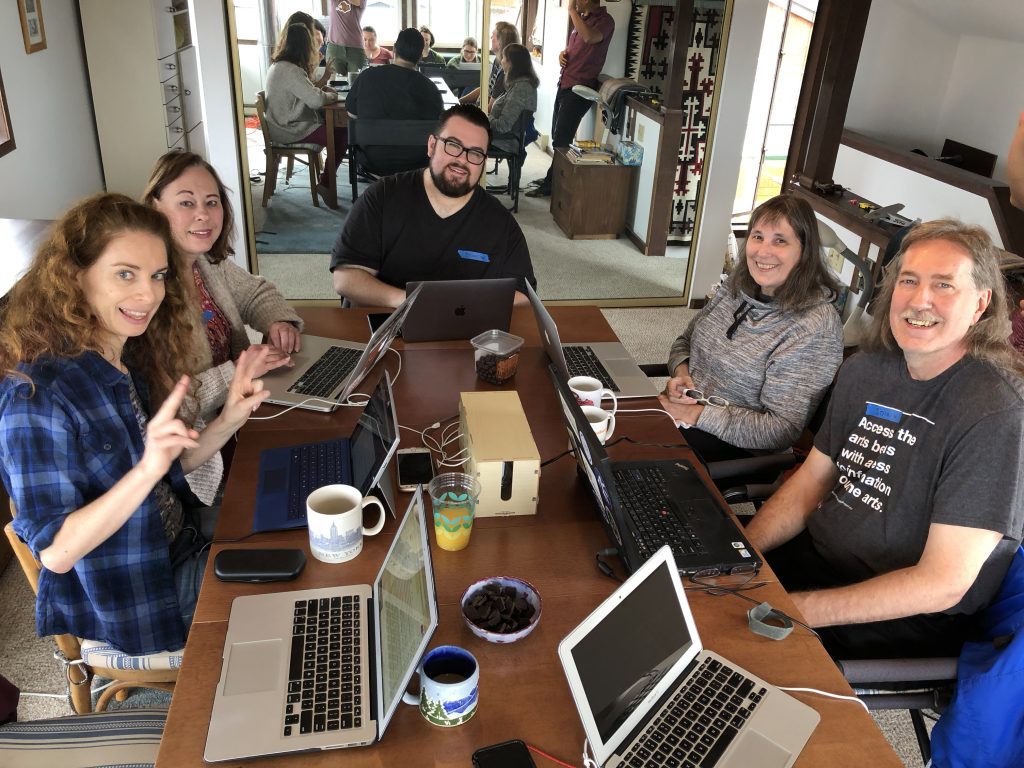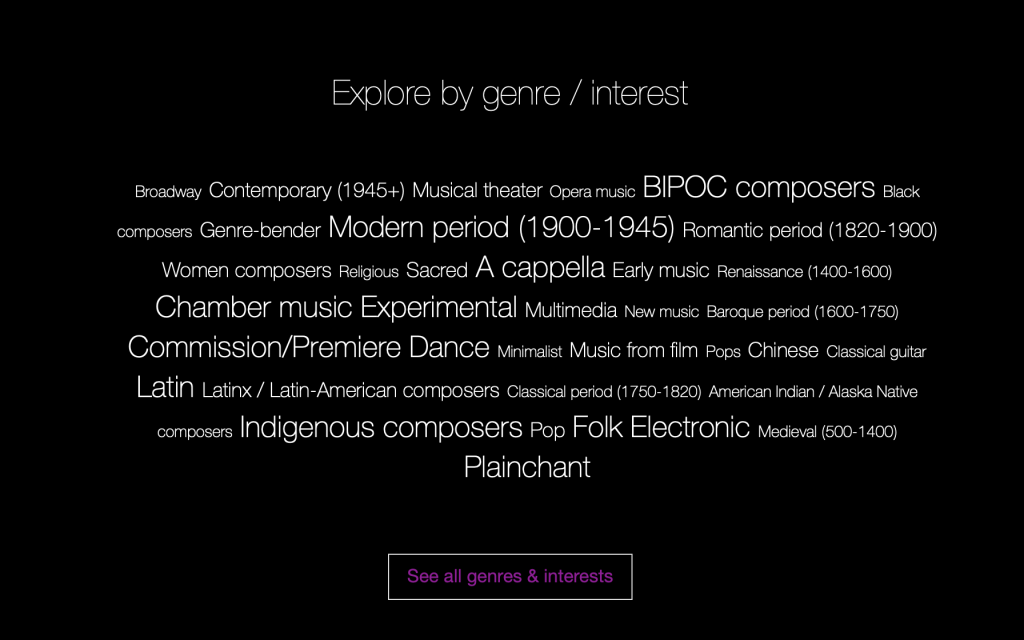The Creative Wire
We Make It Easy to Be Curious: Live Music Project and the “Lost” Art of Concert Listings
Oct. 10, 2025 | by Megan Ihnen
Edited by Lara Pellegrinelli

Megan Ihnen, faculty member in Peabody’s Professional Studies Department, is on a mission to revive concert listings, as described in the essay below, through her non-profit organization, Live Music Project (LMP).
Join her for an in-person workshop supporting Baltimore’s vibrant local music scene on Tuesday, October 14 from 4:30 to 6:30 at Peabody in the Unger Conference Room. At this “event-a-thon,” participants will learn how to add upcoming concerts to LMP’s online calendar, helping music fans discover and attend performances around the city.
Bring your laptop, power cord, and a good eye for detail—LMP will provide everything else (including snacks)! – Ed.
——————————————————————————————————————-

Reading composer and singer-songwriter Gabriel Kahane’s recent piece in The Atlantic, “The Lost Art of Listings,” I found myself unexpectedly moved.
When Kahane relocated to New York City in the early 2000s, he could flip through Time Out New York or the Village Voice and discover a week’s worth of wonders: a free jazz set in a basement, a student opera in a church, a performance-art experiment on a loading dock. The event listings in these and other publications were more than informational; they offered invitation, serendipity, and community to the musically curious.
Over the past 20 years, those print listings – and their digital descendants – have nearly vanished. Kahane laments the disappearance of this shared cultural compass with care and clarity. For those of us working in community arts access, it felt like someone had finally turned on a light.
And yet, the collapse of hyperlocal, community-centered listings is not a total loss. They endure, even if under-resourced. A system still exists, operating quietly—and it lives on, in part, through Live Music Project (LMP).
Community Reborn from a Listings Graveyard
The internet, we thought, would solve the problem. Instead, it fractured communication. Algorithms surface what’s already popular or reinforce silos. Social media rewards visibility, not vitality. Artists – in particular, those in early music, classical, contemporary classical, and experimental styles – are left shouting into the void.
“The immediate danger is that artists play, and people don’t know about it,” jazz critic Nate Chinen tells Kahane. He’s right. But it doesn’t have to be this way.
At LMP, we’ve spent more than a decade building a vital tool: a comprehensive, community-driven concert calendar where student groups and grassroots arts organizations can list their events alongside major symphonies. We don’t gatekeep information based on prestige. We make it easy to share. And we don’t let algorithms decide what you’re going to hear.
To that end, we have built:
- A potentially global infrastructure for event listings centered on early music, classical, and contemporary classical music—genres often overlooked by mainstream platforms.
- A concert calendar with over 200,000 annual users, many of whom receive our weekly, city-specific listings email.
- A searchable interface that allows musical discovery by composer, instrumentation, accessibility, family-friendliness, and more—not just an artist’s name or popularity.
- A replicable, scalable model for community-powered data collection, fueled by volunteers and supported by a tech backbone designed collaboratively by musicians and developers.
We’ve also paired access to information about live music with access to the experience of the music itself through our Spontaneous Free Tickets program, which distributes tickets from local arts organizations to community members who might not otherwise be able to attend. So far, we’ve given away $180,000 in tickets.

Proof It Works: Portland, Seattle, New York City, and Beyond
In Portland, Oregon, where Kahane serves as the Creative Chair of the Oregon Symphony, both the symphony and local artists – including Kahane himself – are regularly listed on our platform.
In Seattle, where LMP first launched, we’ve shared nearly 20,000 events, supporting hundreds of organizations and individual musicians.
And in New York, which LMP added as a focus city in 2021, we’ve already listed more than 6,000 events—proof that this infrastructure remains essential even in a bustling, culture capital.
One user told us: “When you see a trailhead, you can’t help but explore. The Live Music Project is the trailhead—the overture of the musical experience.” I can’t think of a better metaphor.
Rebuilding the Connective Tissue
We know that we can’t fully replace what was lost. The tactile intimacy of flipping through paper listings – and the chance discovery of a puppet opera next to a metal show next to a poetry reading in a laundromat – can’t be recreated online in quite the same way. That mix of highbrow, lowbrow, and uncategorizable experiences made each feel valid and thrilling.
But right now, the arts sector spends millions commissioning works, paying performers, and funding productions while investing far too little in the connective tissue that helps audiences actually find these events. The absence of robust, accessible listings isn’t a minor inconvenience. It is a structural failure with ripple effects across the cultural landscape. It’s a preventable erosion of public engagement, diversity in audiences, and ultimately, sustainability for artists.
Live Music Project helps the people making music and the people searching for it find each other. We’re a small team with a wide reach, and we know our system works. But we also know it works best when people join us. That means musicians sharing their concerts, volunteers helping to gather and publish listings, and audiences using the calendar to discover something new.
You’re invited. We’ve saved a seat for you. Explore the calendar. Share it with friends. Submit your own events, or volunteer to help keep the system running. Together, we can make sure the door to live music stays open for anyone ready to remember — or discover for the first time – how deeply human it feels to sit in a room and listen together.
——————————————————————————————————————-

Megan Ihnen
Professional Studies Faculty
MM ‘09, Voice

Megan Ihnen, Executive Director of Live Music Project, is a mezzo-soprano on a mission to change the world through the commissioning, performance, and the proliferation of new music. She performs with ensembles across the country and is the creator behind The Sybaritic Singer. The act of live performance is integral to Megan's worldview and fuels her desire to see Live Music Project grow.